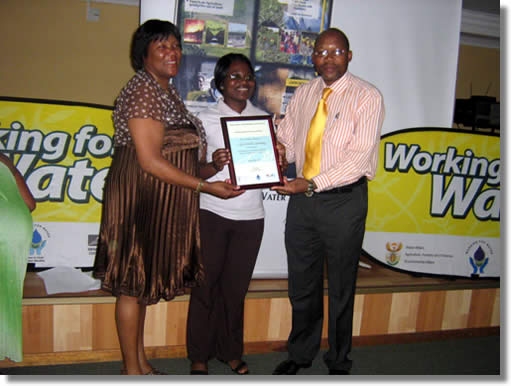The 2nd National Teachers Conference organized by Working for Water Programme (WfW) was held in Polokwane, Limpopo Province, from the 28th of September to 1st of October 2010 and the Iimbovane Outreach Project was invited to showcase their work.
The conference served as a forum to discuss the need to include pressing environmental issues like invasive alien plants (IAPs) into daily classroom lessons and ultimately, to take steps, no matter how small, in addressing these issues. “Think globally, act locally” was the theme of the conference and with it encouraging educators to take practical actions at their various schools to start addressing environmental issues.
“Teachers are instrumental in the building of a progressive nation through sound education of their learners. It is therefore imperative to create and sustain a platform like this where teachers from across the nation can converge to share in each other’s expertise and to grow as teachers.” says Mrs. Florence Gamanie, National education Officer (WfW).
Indeed, many educators and their learners were already taking major strides in addressing some of these issues, such as clearing projects that focused on IAPs, or rearing specific beetle species as biological control agents for the invasive water hyacinth plant Echornia crassipes. It wasn’t all about IAPs though, as several topics on environmental issues were also presented. For example, some educators engaged their learners in waste management projects such as recycling paper, plastics and food materials while others focused on preventing soil erosion at their school grounds through planting indigenous trees and creating vegetable gardens, to name just a few.
Worth mentioning, however, was a captivating talk by GET Co-ordinator Mr. Fadli Wagiet which was filled with guidelines on how educators could create sustainable projects. He emphasized on the dangers of finding “quick fix” solutions to every environmental issue and the need to monitor and quantify when creating projects, so as to be certain of whether or not progress was being made in meeting with the project’s objectives. Monitoring and quantifying is an integral part of Iimbovane project and it was a great privilege when Iimbovane was given a plenary session by acting chairperson and Deputy Director for Environmental Education, Mr. Donovan Fullard. The talk was well received, with several educators eager to know more about the project and how to implement it at their schools. Amongst the presenting educators was Diazville High School Life Science educator Mrs. Ursula Carstens, whose school is a participant in the Iimbovane project. She showcased the importance of the Iimbovane project in raising environmental awareness among her Grade 10 Life Science learners, during her presentation.
A field excursion to the beautiful town of Tzaneen later in the week aided all to see the bigger picture in reality as many IAPs were discussed as well as the efforts put in place to limit their spread by WfW. Overall, the conference successfully reinforced the need to continue raising environmental awareness, finding solutions to environmental problems, sharing knowledge and learning from one another. And as one educator summed it up, “were it not for this conference, how could I have known that Argentine ants were raging war on our very own Iimbovane?”
